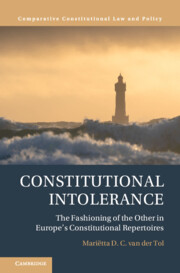Book contents
- Constitutional Intolerance
- Comparative Constitutional Law and Policy
- Constitutional Intolerance
- Copyright page
- Dedication
- Contents
- Acknowledgements
- 1 What Is Constitutional Intolerance?
- 2 Governing Religious Difference
- 3 Toleration, Time, and the Other
- 4 National Identity, Publicness, and Public Space
- 5 Dynamic Interpretation of Constitutional Concepts
- 6 Ad libitum Use of Constitutional Concepts
- 7 Constitutional Identity as a Political Instrument
- 8 Pseudo-constitutional Repertoires
- 9 Conclusion
- Bibliography
- Index
7 - Constitutional Identity as a Political Instrument
New Fundamental Law in Hungary
Published online by Cambridge University Press: 09 January 2025
- Constitutional Intolerance
- Comparative Constitutional Law and Policy
- Constitutional Intolerance
- Copyright page
- Dedication
- Contents
- Acknowledgements
- 1 What Is Constitutional Intolerance?
- 2 Governing Religious Difference
- 3 Toleration, Time, and the Other
- 4 National Identity, Publicness, and Public Space
- 5 Dynamic Interpretation of Constitutional Concepts
- 6 Ad libitum Use of Constitutional Concepts
- 7 Constitutional Identity as a Political Instrument
- 8 Pseudo-constitutional Repertoires
- 9 Conclusion
- Bibliography
- Index
Summary
This chapter analyses constitutional intolerance on the basis of the Hungarian Church Law of 2011, which deregistered hundreds of religious organisations, attached special conditions to re-registration, and privileged a number of politically favoured religious organisations in return for their political legitimation and support. These micro-legal actions are analysed within the context of the notion of the “System of National Cooperation” and “constitutional identity”. Constitutional intolerance in Hungary appears to stem from a traditionalist commitment to protect traditional values: on the one hand, by strengthening the position of the main Hungarian churches, and on the other hand, by championing anti-liberal policies on gender and sexuality, including the prohibition from exposing minors to “gay propaganda”. But the varnish of Christianity is relatively thin: Hungarian society is thoroughly secularised with low numbers of church attendance, with language and ethnicity taking precedence over religion in their importance to national identity.
Keywords
- Type
- Chapter
- Information
- Constitutional IntoleranceThe Fashioning of the Other in Europe's Constitutional Repertoires, pp. 104 - 126Publisher: Cambridge University PressPrint publication year: 2025

